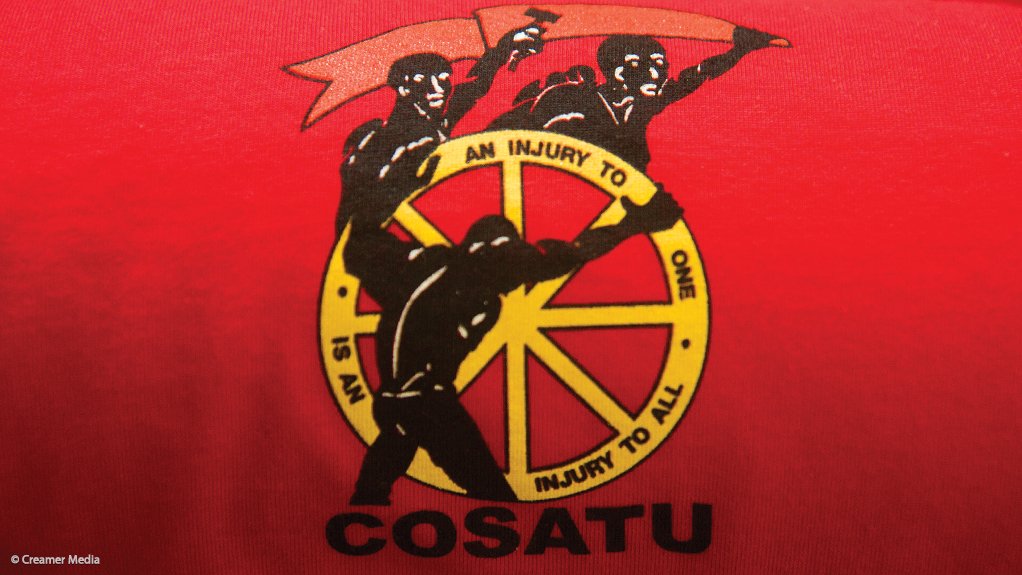/ MEDIA STATEMENT / The content on this page is not written by Polity.org.za, but is supplied by third parties. This content does not constitute news reporting by Polity.org.za.
The Joint Mandating Committee (JMC) of the public sector trade unions organised under Congress of South African Trade Unions (COSATU), who command the majority at the Public Service Coordinating Bargaining Council (PSCBC) has together with other unions, who are parties in Council tabled our demands for this round of wage negotiations. This tabling of demands comes in the backdrop of the Constitutional Court ruling against labour on the implementation of clause 3.3 of Resolution 1 of 2018.
Among many of the demands submitted is the call for a 10% increase across the board on the Cost-of-living adjustment (COLA), the R2 500 on housing allowance, and the permanent employment of contract workers which includes the Community Health Workers, the Teacher Assistants, and the Police Reservists. The double digit increase demand is informed by the fact that the global and domestic volatility of inflation has left workers struggling to keep up with the cost of living.
The escalating inflation which has been forecast at 5.9% by StatsSA and at 8.1% by the IMF warrants a justifiable higher than inflation demand especially on COLA. Considering this 5.9% inflation means that our demands will culminate into a real increase of 3.1% above inflation.
Workers are faced with multiple increases in commodities with the fuel price rising to a record 33.2% year on year (April to March), while between February and March 2022 the increase was at 7.2%. This price hike has a direct bearing on workers who commute on public transport and private transport daily.
NERSA has granted Eskom electricity tariffs increase of 9.61%, while food inflation is at 6.4% year on year. It is envisaged that the food inflation will increase nominally, especially in the wake of global geopolitical crisis in Europe, which will affect among others, the price of barley where Russia is the main producer. In total, these three most important expenses for South African low-paid consumers makes up 23,34% of the total CPI basket.
The tabling also comes at the time where labour has presented an economic outlook in which we rebutted the view of employer pleading poverty even against the budget overrun of R469bn. This excess in revenue collection for the financial year 2021/22 has given the fiscus a lifeline to invest economic spending for the much-needed economic growth. In their economic outlook presentation last week at the PSCBC, the employer emphasised the servicing of high debt as a primary reason for unaffordability and placed the wage bill as one of the high-cost items on its balance sheet.
Our belief is that the wage bill is not the cause of the country’s soaring levels of debt but economic stagnation that comes from misguided policy choices and lack of consequence management for entrenched corruption in the public service.
In their own presentation, the employer has shown that the wage bill has decreased from 35.7% in 2013/14 financial year to 32% in 2021/22. This decrease in budget on wage bill is evidence of either a decreasing headcount in which vacant post are not filled or a concerted effort to casualise the public service through contract employment.
We believe that public service is understaffed amid the growing demand for public service. Our call to increase staffing in the public service has never been this relevant as is common knowledge that the public service employed 1 269 141 people servicing a total population of about 40.6 million in 1994. In 2021 the public service employed 1 235 768 against the population of about 60.1 million, and this proves that the public service employment has not kept up with the rising population numbers and this is translated into high crime and gender based violence, low education outcomes and a strain on the public health sector. We believe that public service needs an additional 592 689 to keep up with size of the population and creating contract employment is not an answer.
Our demands for provision of housing to ordinary public servants remain the sore point in our struggle for dignity as many public servants remain homeless even after signing a resolution on Government Employee Housing Scheme in 2015. Most public servants continue to be denied decent housing by the banking system in South Africa, while at the same time they are not eligible for the RDP housing scheme. The cost of housing has escalated, and public servants are forced into rental options. Our demand of R2 500 increase in allowance is mainly informed by affordability of housing in South Africa.
The other demands are envisioned at bettering the livelihoods of public servants who performed commendably during the recent national disaster periods. We want to reassure our members that we have heeded their call to demand a real increase. Everything submitted at the PSCBC is sensitive and reflect their submission during the mandatory process. We strongly believe that our demands are reasonable, affordable, achievable and we are therefore committed to defend them at all costs. We are conscious of the reality of a new economic austerity policy trajectory, which is being advanced by the employer even against the legitimate demands of workers who continue to serve the public with all diligence.
Issued by Cosatu
EMAIL THIS ARTICLE SAVE THIS ARTICLE ARTICLE ENQUIRY
To subscribe email subscriptions@creamermedia.co.za or click here
To advertise email advertising@creamermedia.co.za or click here











